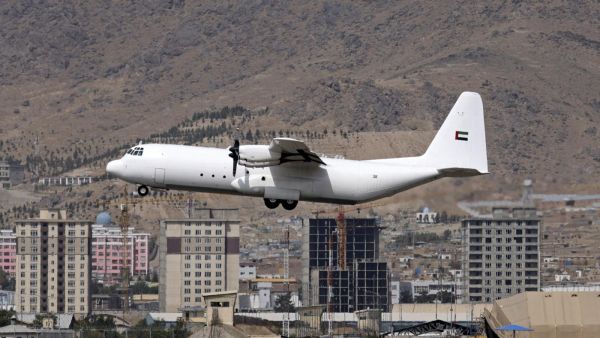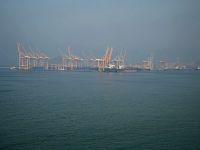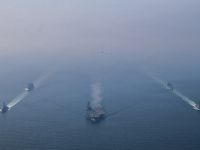The past decades of diplomatic relations between Afghanistan and the United Arab Emirates were accompanied by ups and downs, such as the severance of relations in 1973, the Cold War, and disputes over the Soviet invasion, the victory of the Afghan Jihad, and the opening of the Afghan embassy in Abu Dhabi in 1993.
In fact, besides Pakistan and Saudi Arabia, the only government that recognized the Taliban government (from 1996 to the end of 2001) was the UAE. But actually, due to the Taliban's support for Al-Qaeda and terrorism, their relations gradually decreased and were cut off in the summer of 2001. In the current situation, important variables seem to be involved in Abu Dhabi's view of Afghanistan.
Important areas in the UAE's approach to Afghanistan:
Geopolitics and regional competition:
The UAE has tried to pursue its national interests in the international arena in bilateral or multilateral formats. Also, the UAE has tried to compete with the influence of Tehran and Ankara in Afghanistan, separately or with the coordination of the Gulf Cooperation Council.
Although the UAE has little chance of replacing Pakistan's role in Afghanistan, more attention to Afghanistan and a strong presence in the region can help the UAE to play a better role in Central Asia.
Flight RQ904 from Abu Dhabi to Kabulhttps://t.co/WpuIn5EONC pic.twitter.com/qMgS7r3HXI
— Oscar55 (@donal444) October 16, 2022
In fact, the Muslim Brotherhood congratulated the Taliban on taking power in Afghanistan. While the UAE considered hosting the Taliban office in Qatar as negative for years, Abu Dhabi's rivalry with Qatar-Turkey in Afghanistan issues can be an incentive to play a greater role in Afghanistan. In fact, it seems that Abu Dhabi is trying to reduce the influence of Turkey, Qatar, and Muslim Brotherhood movements among Afghan Sunnis. In other words, an Islamist Brotherhood government in Kabul is not in the interest of the UAE.
Security and anti-terrorism:
Undoubtedly, UAE's foreign policy in Afghanistan is affected by factors such as security concerns, internal stability, security, and securing interests. The power vacuum in Afghanistan is the best opportunity for extremists under the pretext of jihad. Even now, containing the regional effects of the Afghanistan crisis is important in the foreign policy of the UAE.
In addition to the previous presence of tens of thousands of Arab fighters in Afghanistan in the 80s and 90s, the negative effects caused by the emergence of ISIS spread to Arab countries. Also, Afghanistan is still a crucial country for the development of the Arab world. In fact, after the return of the Taliban, the UAE is worried about Afghanistan becoming a training ground for extremism.
ISIS-K and al-Qaeda both seek to attract citizens and financial support from Emiratis, so they can disrupt the stability of this country. In fact, it seems that on the one hand, the UAE is seeking to reduce its security concerns with approaches such as confronting ISIS or (ISIS-K) and consulting and cooperating with regional and global players. On the other hand, it tries to prevent the Taliban from becoming an inspiration for jihadist ideology, and by pressuring them to cut ties with terrorists and prevent the use of the land of Afghanistan, the country does not become a safe haven for transnational jihadists.
On the other hand, in 2013, Kabul and Abu Dhabi signed the "Strategic and Security Cooperation Agreement." But now it seems that the UAE is pursuing the Taliban's distance from the terrorist groups, the revival of cooperation in the field of counter-terrorism information exchange, dealing with drugs, human trafficking, and illegal immigration with Afghanistan.
Maintaining diplomatic relations and seeking a diplomatic role for Afghanistan:
Although the bitter experience of killing the ambassador and several other Emirati diplomats in the city of Kandahar in February 2017 is still there. But it seems that the UAE is trying to maintain minimal diplomatic relations. In fact, relations with the Taliban without the official recognition of it is a relative advantage. Therefore, after the presence of the Taliban, the UAE closed its embassy in 2021 and later opened it. On the other hand, although the UAE has not been satisfied with some of the Taliban's policies in the past year, it is important for UAE, to be the “center of diplomacy” for Afghanistan’s affairs.
UAE - Afghanistan Economic Relations#DidYouKnow?
Afghan investors have invested over $10 billion in the UAE and around 300,000 Afghans currently are working in the country, a key source of remittances to Afghanistan. #Afghanistan #UAE #economy pic.twitter.com/bO89jLoEqM
— Afghanistan Enterprise Council ?? (@AEC_Afghanistan) May 18, 2022
Therefore, maintaining contact, pursuing constructive dialogue, and mediation with other parties have been considered. In the meantime, with the support of the United States to the UAE, the importance of the UAE's role as a center for diplomacy regarding the Afghan Taliban, branding for the UAE, and strengthening Abu Dhabi's international image has increased.
In fact, the UAE's role in facilitating the evacuation of Afghanistan (more than 41,000 Afghans and foreign nationals) has been to a considerable extent, accompanied by the macro and strategic policy of the United States in the field of Afghanistan. In this approach, many citizens of France, Britain, Japan, Australia, the United States, etc., have been evacuated with the help of the UAE to leave Afghanistan.
The cooperation in the resettlement plan of more than 10,000 Afghans from the UAE to the United States and other places is a manifestation of Washington's cooperation with Abu Dhabi.
Apart from this, the UAE usually does not accept, and the previous efforts of the UAE for peace talks between the Afghan parties were unsuccessful. But Abu Dhabi can play an important role in any peace process between the Taliban and the opposition in Afghanistan by the Previous hosting of talks and, having a better relationship with some Taliban officials, giving asylum to Ghani, the fugitive president of Afghanistan, in the summer of 2021 and accepting some former Afghan officials.
On the other hand, as one of the most important global humanitarian centers, the Emirate has tried to make bilateral and international efforts to solve the humanitarian crisis and humanitarian aid in various fields to Afghanistan. Abu Dhabi has been one of the biggest donors to Afghanistan since 2021, with about 200 million dollars.
In the same framework, the UAE has made efforts for multilateral cooperation with organizations such as the Organization of Islamic Cooperation (OIC) in areas such as facilitating the delivery of humanitarian aid, medical equipment, and field hospitals, dealing with the epidemic of COVID-19 and minimizing the risk of diversion of aid in Afghanistan. In fact, Abu Dhabi is trying to create a positive image of the UAE by establishing positive relations with the people of Afghanistan to increase its soft power in Afghanistan.
Assistance and creation of economic and commercial opportunities:
Despite the extensive economic challenges in Afghanistan, the Taliban look to the UAE as a center for the expansion of trade, companies, financing operations, the rich Afghan diaspora, the expansion of flights, and economic and commercial activities.
In fact, although the political-security situation in Afghanistan is not stabilized, there are opportunities in various sectors, such as extractive industries and agriculture in Afghanistan. In this regard, Abu Dhabi is trying to help and invest in the business, transportation, and airport operation with considerations and precautions. Recently, after the failure of Turkey and Qatar in the negotiations, the UAE-based GAAC company signed an agreement with the Taliban for flight management, development of the aviation sector, the return of international airlines, air traffic control, etc. In another area, the UAE had previously given assistance and commitments in the Tokyo, Berlin, and London donor conferences for various projects.
Now, about 150-300 thousand Afghan citizens in the UAE can play an important role in bilateral trade with some 4 billion dollars in assets. It seems that Abu Dhabi prefers to make the Taliban softer and more flexible through means of investment and aid.
Vision
Various security, political, economic, and geopolitical factors and variables have an effect on the future of the UAE's actions and activities in Afghanistan. Both the Taliban want the UAE to invest extensively in Afghanistan, and Abu Dhabi sees the investment, aid, and credits as a card to adjust the Taliban and obtain concessions.
It seems that UAE's foreign policy in Afghanistan will not witness any change, and apart from continuing to pay attention to minimum aid and investment, it will wait for the future of Afghanistan's political and security developments.
However, it is likely that Abu Dhabi will play a role in the Taliban-US and Taliban-opposition negotiations to ensure stability and the formation of an inclusive government in this country. In addition, the UAE will continue to work with the United States and Europe to achieve social and economic development in Afghanistan, the rights of women, and the education of Afghan girls.
However, the UAE has limited influence on the Taliban and has disagreements with the traditional-ethnic type of Islam of the Taliban. In the meantime, in the short term, if the West refuses to recognize the Taliban, the relations between the UAE and the Taliban will be accompanied by more challenges.







